Understanding Digital Logic Design
Extra materials for the combined MIPSfpga and Connected MCU seminar by Imagination Technologies
October-November 2016
Quiz 2.3. Finite State Machines
Name ___________________________________________________________________
Write near each state diagram the name of the corresponding module:
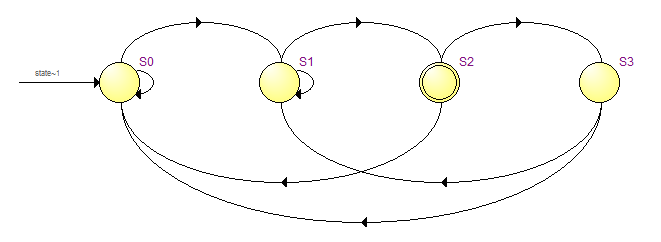
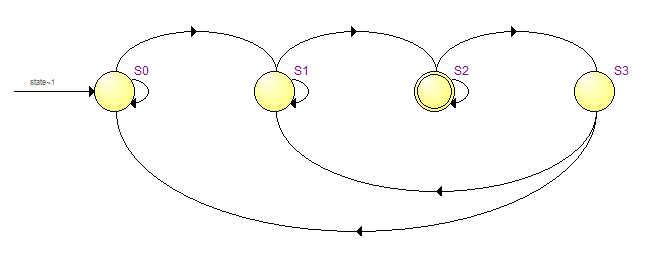
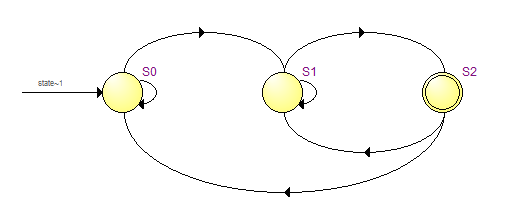
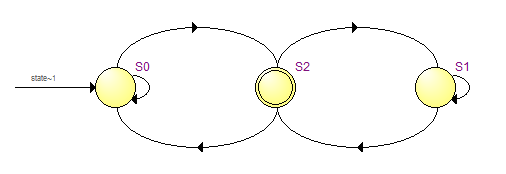
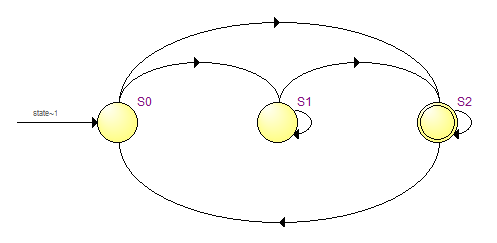 module top1
(
input clock,
input resetn,
input a,
output y
);
parameter [1:0] S0 = 0, S1 = 1, S2 = 2;
reg [1:0] state, next_state;
// state register
always @ (posedge clock or negedge resetn)
if (! resetn)
state <= S0;
else
state <= next_state;
// next state logic
always @*
begin
next_state = state;
case (state)
S0:
if (! a)
next_state = S1;
else
next_state = S2;
S1:
if (a)
next_state = S2;
S2:
if (a)
next_state = S0;
endcase
end
// output logic
assign y = (state == S2);
endmodule
module top2
(
input clock,
input resetn,
input a,
output y
);
parameter [2:0] S0 = 0, S1 = 1, S2 = 2, S3 = 3;
reg [1:0] state, next_state;
// state register
always @ (posedge clock or negedge resetn)
if (! resetn)
state <= S0;
else
state <= next_state;
// next state logic
always @*
begin
next_state = state;
case (state)
S0:
if (! a)
next_state = S1;
S1:
if (a)
next_state = S2;
S2:
if (a)
next_state = S0;
else
next_state = S3;
S3:
if (a)
next_state = S0;
else
next_state = S1;
endcase
end
// output logic
assign y = (state == S2);
endmodule
module top3
(
input clock,
input resetn,
input a,
output y
);
parameter [2:0] S0 = 0, S1 = 1, S2 = 2, S3 = 3;
reg [1:0] state, next_state;
// state register
always @ (posedge clock or negedge resetn)
if (! resetn)
state <= S0;
else
state <= next_state;
// next state logic
always @*
begin
next_state = state;
case (state)
S0:
if (! a)
next_state = S1;
S1:
if (a)
next_state = S2;
S2:
if (a)
next_state = S3;
S3:
if (a)
next_state = S0;
else
next_state = S1;
endcase
end
// output logic
assign y = (state == S2);
endmodule
module top4
(
input clock,
input resetn,
input a,
output y
);
parameter [1:0] S0 = 0, S1 = 1, S2 = 2;
reg [1:0] state, next_state;
// state register
always @ (posedge clock or negedge resetn)
if (! resetn)
state <= S0;
else
state <= next_state;
// next state logic
always @*
begin
next_state = state;
case (state)
S0:
if (! a)
next_state = S1;
S1:
if (a)
next_state = S2;
S2:
if (a)
next_state = S0;
else
next_state = S1;
endcase
end
// output logic
assign y = (state == S2);
endmodule
module top5
(
input clock,
input resetn,
input a,
output y
);
parameter [1:0] S0 = 0, S1 = 1, S2 = 2;
reg [1:0] state, next_state;
// state register
always @ (posedge clock or negedge resetn)
if (! resetn)
state <= S0;
else
state <= next_state;
// next state logic
always @*
begin
next_state = state;
case (state)
S0:
if (! a)
next_state = S2;
S1:
if (a)
next_state = S2;
S2:
if (a)
next_state = S0;
else
next_state = S1;
endcase
end
// output logic
assign y = (state == S2);
endmodule
Quiz is created by Yuri Panchul
module top1
(
input clock,
input resetn,
input a,
output y
);
parameter [1:0] S0 = 0, S1 = 1, S2 = 2;
reg [1:0] state, next_state;
// state register
always @ (posedge clock or negedge resetn)
if (! resetn)
state <= S0;
else
state <= next_state;
// next state logic
always @*
begin
next_state = state;
case (state)
S0:
if (! a)
next_state = S1;
else
next_state = S2;
S1:
if (a)
next_state = S2;
S2:
if (a)
next_state = S0;
endcase
end
// output logic
assign y = (state == S2);
endmodule
module top2
(
input clock,
input resetn,
input a,
output y
);
parameter [2:0] S0 = 0, S1 = 1, S2 = 2, S3 = 3;
reg [1:0] state, next_state;
// state register
always @ (posedge clock or negedge resetn)
if (! resetn)
state <= S0;
else
state <= next_state;
// next state logic
always @*
begin
next_state = state;
case (state)
S0:
if (! a)
next_state = S1;
S1:
if (a)
next_state = S2;
S2:
if (a)
next_state = S0;
else
next_state = S3;
S3:
if (a)
next_state = S0;
else
next_state = S1;
endcase
end
// output logic
assign y = (state == S2);
endmodule
module top3
(
input clock,
input resetn,
input a,
output y
);
parameter [2:0] S0 = 0, S1 = 1, S2 = 2, S3 = 3;
reg [1:0] state, next_state;
// state register
always @ (posedge clock or negedge resetn)
if (! resetn)
state <= S0;
else
state <= next_state;
// next state logic
always @*
begin
next_state = state;
case (state)
S0:
if (! a)
next_state = S1;
S1:
if (a)
next_state = S2;
S2:
if (a)
next_state = S3;
S3:
if (a)
next_state = S0;
else
next_state = S1;
endcase
end
// output logic
assign y = (state == S2);
endmodule
module top4
(
input clock,
input resetn,
input a,
output y
);
parameter [1:0] S0 = 0, S1 = 1, S2 = 2;
reg [1:0] state, next_state;
// state register
always @ (posedge clock or negedge resetn)
if (! resetn)
state <= S0;
else
state <= next_state;
// next state logic
always @*
begin
next_state = state;
case (state)
S0:
if (! a)
next_state = S1;
S1:
if (a)
next_state = S2;
S2:
if (a)
next_state = S0;
else
next_state = S1;
endcase
end
// output logic
assign y = (state == S2);
endmodule
module top5
(
input clock,
input resetn,
input a,
output y
);
parameter [1:0] S0 = 0, S1 = 1, S2 = 2;
reg [1:0] state, next_state;
// state register
always @ (posedge clock or negedge resetn)
if (! resetn)
state <= S0;
else
state <= next_state;
// next state logic
always @*
begin
next_state = state;
case (state)
S0:
if (! a)
next_state = S2;
S1:
if (a)
next_state = S2;
S2:
if (a)
next_state = S0;
else
next_state = S1;
endcase
end
// output logic
assign y = (state == S2);
endmodule
Quiz is created by Yuri Panchul




 module top1
(
input clock,
input resetn,
input a,
output y
);
parameter [1:0] S0 = 0, S1 = 1, S2 = 2;
reg [1:0] state, next_state;
// state register
always @ (posedge clock or negedge resetn)
if (! resetn)
state <= S0;
else
state <= next_state;
// next state logic
always @*
begin
next_state = state;
case (state)
S0:
if (! a)
next_state = S1;
else
next_state = S2;
S1:
if (a)
next_state = S2;
S2:
if (a)
next_state = S0;
endcase
end
// output logic
assign y = (state == S2);
endmodule
module top2
(
input clock,
input resetn,
input a,
output y
);
parameter [2:0] S0 = 0, S1 = 1, S2 = 2, S3 = 3;
reg [1:0] state, next_state;
// state register
always @ (posedge clock or negedge resetn)
if (! resetn)
state <= S0;
else
state <= next_state;
// next state logic
always @*
begin
next_state = state;
case (state)
S0:
if (! a)
next_state = S1;
S1:
if (a)
next_state = S2;
S2:
if (a)
next_state = S0;
else
next_state = S3;
S3:
if (a)
next_state = S0;
else
next_state = S1;
endcase
end
// output logic
assign y = (state == S2);
endmodule
module top3
(
input clock,
input resetn,
input a,
output y
);
parameter [2:0] S0 = 0, S1 = 1, S2 = 2, S3 = 3;
reg [1:0] state, next_state;
// state register
always @ (posedge clock or negedge resetn)
if (! resetn)
state <= S0;
else
state <= next_state;
// next state logic
always @*
begin
next_state = state;
case (state)
S0:
if (! a)
next_state = S1;
S1:
if (a)
next_state = S2;
S2:
if (a)
next_state = S3;
S3:
if (a)
next_state = S0;
else
next_state = S1;
endcase
end
// output logic
assign y = (state == S2);
endmodule
module top4
(
input clock,
input resetn,
input a,
output y
);
parameter [1:0] S0 = 0, S1 = 1, S2 = 2;
reg [1:0] state, next_state;
// state register
always @ (posedge clock or negedge resetn)
if (! resetn)
state <= S0;
else
state <= next_state;
// next state logic
always @*
begin
next_state = state;
case (state)
S0:
if (! a)
next_state = S1;
S1:
if (a)
next_state = S2;
S2:
if (a)
next_state = S0;
else
next_state = S1;
endcase
end
// output logic
assign y = (state == S2);
endmodule
module top5
(
input clock,
input resetn,
input a,
output y
);
parameter [1:0] S0 = 0, S1 = 1, S2 = 2;
reg [1:0] state, next_state;
// state register
always @ (posedge clock or negedge resetn)
if (! resetn)
state <= S0;
else
state <= next_state;
// next state logic
always @*
begin
next_state = state;
case (state)
S0:
if (! a)
next_state = S2;
S1:
if (a)
next_state = S2;
S2:
if (a)
next_state = S0;
else
next_state = S1;
endcase
end
// output logic
assign y = (state == S2);
endmodule
Quiz is created by Yuri Panchul
module top1
(
input clock,
input resetn,
input a,
output y
);
parameter [1:0] S0 = 0, S1 = 1, S2 = 2;
reg [1:0] state, next_state;
// state register
always @ (posedge clock or negedge resetn)
if (! resetn)
state <= S0;
else
state <= next_state;
// next state logic
always @*
begin
next_state = state;
case (state)
S0:
if (! a)
next_state = S1;
else
next_state = S2;
S1:
if (a)
next_state = S2;
S2:
if (a)
next_state = S0;
endcase
end
// output logic
assign y = (state == S2);
endmodule
module top2
(
input clock,
input resetn,
input a,
output y
);
parameter [2:0] S0 = 0, S1 = 1, S2 = 2, S3 = 3;
reg [1:0] state, next_state;
// state register
always @ (posedge clock or negedge resetn)
if (! resetn)
state <= S0;
else
state <= next_state;
// next state logic
always @*
begin
next_state = state;
case (state)
S0:
if (! a)
next_state = S1;
S1:
if (a)
next_state = S2;
S2:
if (a)
next_state = S0;
else
next_state = S3;
S3:
if (a)
next_state = S0;
else
next_state = S1;
endcase
end
// output logic
assign y = (state == S2);
endmodule
module top3
(
input clock,
input resetn,
input a,
output y
);
parameter [2:0] S0 = 0, S1 = 1, S2 = 2, S3 = 3;
reg [1:0] state, next_state;
// state register
always @ (posedge clock or negedge resetn)
if (! resetn)
state <= S0;
else
state <= next_state;
// next state logic
always @*
begin
next_state = state;
case (state)
S0:
if (! a)
next_state = S1;
S1:
if (a)
next_state = S2;
S2:
if (a)
next_state = S3;
S3:
if (a)
next_state = S0;
else
next_state = S1;
endcase
end
// output logic
assign y = (state == S2);
endmodule
module top4
(
input clock,
input resetn,
input a,
output y
);
parameter [1:0] S0 = 0, S1 = 1, S2 = 2;
reg [1:0] state, next_state;
// state register
always @ (posedge clock or negedge resetn)
if (! resetn)
state <= S0;
else
state <= next_state;
// next state logic
always @*
begin
next_state = state;
case (state)
S0:
if (! a)
next_state = S1;
S1:
if (a)
next_state = S2;
S2:
if (a)
next_state = S0;
else
next_state = S1;
endcase
end
// output logic
assign y = (state == S2);
endmodule
module top5
(
input clock,
input resetn,
input a,
output y
);
parameter [1:0] S0 = 0, S1 = 1, S2 = 2;
reg [1:0] state, next_state;
// state register
always @ (posedge clock or negedge resetn)
if (! resetn)
state <= S0;
else
state <= next_state;
// next state logic
always @*
begin
next_state = state;
case (state)
S0:
if (! a)
next_state = S2;
S1:
if (a)
next_state = S2;
S2:
if (a)
next_state = S0;
else
next_state = S1;
endcase
end
// output logic
assign y = (state == S2);
endmodule
Quiz is created by Yuri Panchul